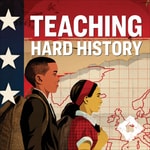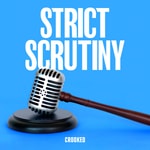Teaching Hard History – Détails, épisodes et analyse
Détails du podcast
Informations techniques et générales issues du flux RSS du podcast.

Teaching Hard History
Learning for Justice
Fréquence : 1 épisode/39j. Total Éps: 71

Classements récents
Dernières positions dans les classements Apple Podcasts et Spotify.
Apple Podcasts
🇨🇦 Canada - courses
28/07/2025#56🇩🇪 Allemagne - courses
28/07/2025#99🇺🇸 États-Unis - courses
28/07/2025#10🇨🇦 Canada - courses
27/07/2025#30🇩🇪 Allemagne - courses
27/07/2025#80🇺🇸 États-Unis - courses
27/07/2025#9🇩🇪 Allemagne - courses
26/07/2025#63🇺🇸 États-Unis - courses
26/07/2025#10🇺🇸 États-Unis - courses
25/07/2025#10🇺🇸 États-Unis - courses
24/07/2025#8
Spotify
Aucun classement récent disponible
Liens partagés entre épisodes et podcasts
Liens présents dans les descriptions d'épisodes et autres podcasts les utilisant également.
See all- https://www.learningforjustice.org/podcastpd
67 partages
- https://nmaahc.si.edu/
46 partages
Qualité et score du flux RSS
Évaluation technique de la qualité et de la structure du flux RSS.
See allScore global : 79%
Historique des publications
Répartition mensuelle des publications d'épisodes au fil des années.
Why Hard History Matters: Addressing the Legacy of Jim Crow – w/ Rep. Hakeem Jeffries
Saison 4 · Épisode 16
mercredi 25 mai 2022 • Durée 01:19:43
Congressman Hakeem Jeffries represents New York’s 8th congressional district. Our final episode this season takes us to the U.S. House of Representatives for a conversation between Rep. Jeffries and his brother, our host, Dr. Hasan Jeffries, to discuss the lingering effects of the Jim Crow era—including voter access, prison and policing reform and other enduring injustices—and to discuss the continued relevance of teaching “hard history” as it relates to public policy today.
Educators! Get a professional development certificate for listening to this episode—issued by Learning for Justice. Listen for the code word, then visit learningforjustice.org/podcastpd.
You can also receive professional development certificates when you listen to LFJ's other education podcasts—Queer America and The Mind Online!
And be sure to visit the enhanced episode transcript for additional classroom resources for teaching about the intersection of sports and race during the Jim Crow era.
Criminalizing Blackness: Prisons, Police and Jim Crow – w/ Robert T. Chase and Brandon T. Jett
Saison 4 · Épisode 15
lundi 16 mai 2022 • Durée 01:49:05
After emancipation, aspects of the legal system were reshaped to maintain control of Black lives and labor. Historian Robert T. Chase outlines the evolution of convict leasing in the prison system. And Historian Brandon T. Jett explores the commercial factors behind the transition from extra-legal lynchings to police enforcement of the color line. We examine the connections between these early practices and the more familiar apparatuses of today’s justice system—from policing to penitentiaries.
Learning for Justice has great tools for teaching about criminal justice during Jim Crow and after, like this article “Teaching About Mass Incarceration: From Conversation to Civic Action”.
Here’s the song “Jody” that Dr. Chase describes using in the classroom (from Bruce Jackson’s Wake Up Dead Man). To learn how coerced labor evolves after Jim Crow, you can read his book, We Are Not Slaves: State Violence, Coerced Labor, and Prisoners' Rights in Postwar America.
Check out Lynching in LaBelle, an amazing digital history project that Dr. Jett created with his students. And to learn more about the evolution of policing, you can read his book, Race, Crime, and Policing in the Jim Crow South.
For even more classroom resources about the history of convict leasing, policing and mass incarceration during the Jim Crow era, be sure to visit the enhanced episode transcript.
And educators! Get a professional development certificate for listening to this episode—issued by Learning for Justice. Listen for the code word, then visit learningforjustice.org/podcastpd.
The New Deal, Jim Crow and the Black Cabinet – w/ Jill Watts
Saison 4 · Épisode 10
jeudi 13 janvier 2022 • Durée 52:43
Opportunities created by the New Deal were often denied to African Americans. And that legacy of exclusion to jobs, loans and services can be seen today in federal programs and policies as well as systemic inequities in housing, education, health and the accumulation of wealth. Historian Jill Watts examines the complicated history of the New Deal, beginning with the growing political influence of Black voters in the 1930s, the election of FDR and the creation of the Black Cabinet.
Educators! Get a professional development certificate for listening to this episode—issued by Learning for Justice. Listen for the code word, then visit tolerance.org/podcastpd.
And be sure to visit the enhanced episode transcript for additional classroom resources for teaching about the intersection of Black military service and American Jim Crow.
Black Soldiers: Global Conflict During Jim Crow – w/ Adriane Lentz-Smith
Saison 4 · Épisode 9
mardi 14 décembre 2021 • Durée 54:00
U.S. involvement in world wars and the domestic Black freedom struggle shaped one another. By emphasizing the diverse stories of servicemen and women, historian Adriane Lentz-Smith situates Black soldiers as agents of American empire who were simultaneously building their own institutions at home. While white elected officials worked to systemically embed segregation into government, African Americans attempted to bolster their citizenship and freedom rights through soldiering.
Educators! Get a professional development certificate for listening to this episode—issued by Learning for Justice. Listen for the code word, then visit tolerance.org/podcastpd.
And be sure to visit the enhanced episode transcript for additional classroom resources for teaching about the intersection of Black military service and American Jim Crow.
Building Black Institutions: Autonomy, Labor and HBCUs – w/ Jelani M. Favors and Tera W. Hunter
Saison 4 · Épisode 8
vendredi 3 décembre 2021 • Durée 01:21:31
Historian Tera Hunter describes Black institution-building post-slavery and throughout the Jim Crow era, illustrating how Black workers reorganized labor to their advantage, despite virulent white resistance. During the same period, historically black colleges and universities (HBCUs) produced future leaders while cultivating resistance to white supremacy—and continue to do so. Educator Jelani Favors explains the evolution of these institutions, noting their legacies of social activism and student advocacy.
Educators! Get a professional development certificate for listening to this episode—issued by Learning for Justice. Listen for the special code word, then visit learningforjustice.org/podcastpd.
Visit our enhanced episode transcript for even more resources about using current events to teach about Black-institution building during the Jim Crow Era.
Premeditation and Resilience: Tulsa, Red Summer and the Great Migration – w/ David Krugler
Saison 4 · Épisode 7
jeudi 11 novembre 2021 • Durée 45:18
Naming the 1921 Tulsa massacre a “race riot” is inaccurate. Historian David Krugler urges listeners to call this and other violent attacks what they were: premeditated attempts at ethnic cleansing. Decades before, African Americans moved North in record numbers during the Great Migration. Krugler delves into connections between diaspora and violence and highlights the strength of Black communities in resistance to white supremacist terrorism.
Visit our enhanced episode transcript for even more resources for teaching about the Great Migration and Anti-Black Collective Violence during the era of Jim Crow.
And Educators! Get a professional development certificate for listening to this episode—issued by Learning for Justice. Listen for the special code word, then visit learningforjustice.org/podcastpd.
Lynching: White Supremacy, Terrorism and Black Resilience – w/ Kidada Williams and Kellie Carter Jackson
Saison 4 · Épisode 6
mardi 26 octobre 2021 • Durée 01:21:01
Black American experiences during Jim Crow were deeply affected by the ever-present threat of lynching and other forms of racist violence. Historian Kidada Williams amplifies perspectives from Black families, telling stories of lynching victims obscured by white newspapers. She and Kellie Carter Jackson urge educators to confront the role of this violence in American history, how major institutions stood idly by, and how Black Americans fought for justice.
** Content Advisory: This episode contains graphic descriptions of racial violence, and we discuss strategies for sharing this difficult content with your students. **
Educators, you can get a professional development certificate for listening to this episode—issued by Learning for Justice. Listen for the special code word, then visit learningforjustice.org/podcastpd.
And be sure to visit the enhanced episode transcript for even more resources for teaching about Lynching during the Jim Crow era.
Correcting History: Confederate Monuments, Rituals and the Lost Cause – w/ Karen Cox
Saison 4 · Épisode 5
mardi 19 octobre 2021 • Durée 01:05:48
The Lost Cause narrative would have us believe that Confederate monuments have always been celebrated, but people have protested them since they started going up. Historian Karen Cox unpacks how the United Daughters of the Confederacy used propaganda to dominate generations of teachings about the Civil War through textbooks, legislation, and popular culture—and how, after the war, the South and the North prized white reconciliation over justice for all.
Educators, you can get a professional development certificate for listening to this episode—issued by Learning for Justice. Listen for the special code word, then visit learningforjustice.org/podcastpd.
And be sure to visit the enhanced episode transcript for even more resources for teaching about the role of the Lost Cause narrative in the Jim Crow era.
Reconstruction 101: Progress and Backlash – w/ Kate Masur
Saison 4 · Épisode 4
mercredi 13 octobre 2021 • Durée 01:51:33
Just months after the Civil War ended, former Confederates had regained political footholds in Washington, D.C. In her overview of Reconstruction, Kate Masur notes how—in the face of evolving, post-slavery white supremacy—Black people claimed their citizenship and began building institutions of their own. Ahmad Ward then takes us to 1860s Mitchelville, South Carolina, where Black policing power, land ownership and more self-governance were the norm.
Visit the enhanced episode transcript for even more resources for teaching about Reconstruction and the Jim Crow era.
And Educators! Get a professional development certificate for listening to this episode—issued by Learning for Justice. Listen for the special code word, then visit learningforjustice.org/podcastpd.
The History of Whiteness and How We Teach About Race – w/ Edward E. Baptist and Aisha White
Saison 4 · Épisode 3
mardi 14 septembre 2021 • Durée 01:20:37
Historian Ed Baptist provides context on the creation and enforcement of a U.S. racial binary that endures today, as well as Black resistance as a force for political change. And Aisha White urges educators to ask themselves, “What did you learn about race when you were younger?” before they engage with children. She argues that self-reflection and ongoing education are vital tools to combat the fallacy of ignoring students’ racialized experiences.
Educators! Get a professional development certificate for listening to this episode—issued by Learning for Justice. Listen for the code word, then visit learningforjustice.org/podcastpd.
To start the conversation in your classroom, this overview of the “Historical Foundations of Race” by David Roediger is a comprehensive and perfect for educators—from the National Museum of African American History & Culture.
For younger learners, P.R.I.D.E.’s Research Findings offer valuable insights into child development and race. And elementary teachers may want to use this lesson—“Looking at Race and Racial Identity in Children’s Books”—from Learning for Justice.
If you’re interested in bringing archival sources into your lessons, Freedom on the Move provides some wonderful, detailed K-12 lessons utilizing fugitive slave ads. And here’s the 1910 essay “The Souls of White Folk” by W.E.B. Du Bois that was quoted in the introduction.
And be sure to visit the enhanced episode transcript for even more classroom resources about teaching the construction of race and the history of whiteness.









